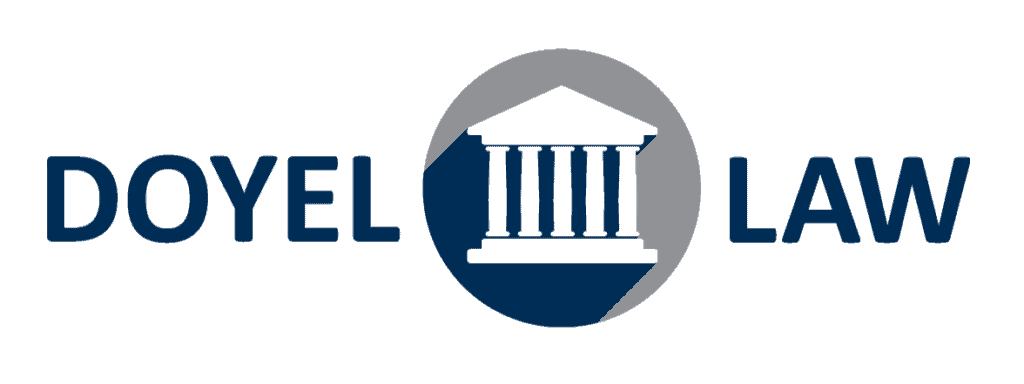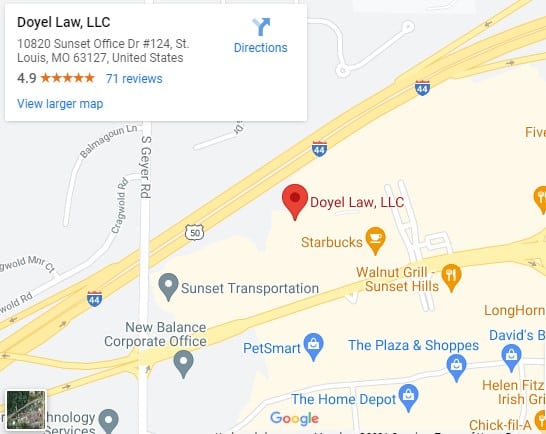Debt Relief Attorney in Sunset, Missouri
Times are tough. Many good, industrious people have more bills than the y can handle due to the current economy. Countless people have struggled to make ends meet due to layoffs, medical challenges, and plain poor luck.
The Doyel Law Firm can assist you if your bills are piling up and you have no way of paying them all. The law allows good people to get a fresh start financially by filing for bankruptcy and our bankruptcy law firm in Sunset Missouri can help you with that. You can cease debt collection, eliminate wage garnishments, and get rid of the burden of mounting expenses by filing bankruptcy. Debt collection activities sometimes border on harassment. In this article, we will answer the question: What can debt collectors do to you?
What Are the Rules for Debt Collectors According to The Fair Debt Collection Practices Act (FDCPA?
People frequently misinterpret who is covered under the FDCPA. Collection agencies, debt buyers, and lawyers that undertake debt collection as a part of their business are all considered third-party debt collectors under the law.
Mortgages, credit card debt, medical debt, school loans, and auto loans are all covered under the FDCPA. The legislation establishes the particular constraints on how a debt collector can contact you. If there is a violation, a lawsuit against the collector or collection agency is required within a year. Can a debt collector phone you at work? When and how can debt collectors contact you?
- Time. Collection agencies can contact you by phone, mail, fax, or email. Debt collectors are not allowed to phone you at odd hours; they may only call you between the hours of 8 a.m. and 9 p.m. local time. Any contact outside of those hours violates the Fair Debt Collection Practices Act.
- Place. Debtors also won’t contact you in unexpected locations like hospitals, schools, or restaurants. While they are theoretically permitted to phone you at home or work, you have the right to request that they do not call you at work. Similarly, if they are aware that personal calls are prohibited at your workplace, they cannot legally contact you while you are there.
- Representation by an Attorney. If a debt collector knows you have an attorney representing you, they are typically not allowed to contact you and must instead contact the attorney. If a debt collector calls when an attorney is representing you, give them the attorney’s contact information and urge them to send any correspondence to them.
What Can Debt Collectors Say?
A debt collector is expected to identify themselves as a debt collector when they call you. They should identify themselves before stating the debt they call about and request payment. They should also let you know that any information you provide them during the conversation will be used in collecting the debt.
The Fair Debt Collection Practices Act (FDCPA) bans debt collectors from harassing their clients in any way, including by abusing, threatening, or misleading words. Harassment can take the form of:
- Using profane language
- Threatening bodily harm
- Misrepresenting what you owe
- Making false claims that you could be arrested
- Threatening your property
- Making repeated attempts to contact you or calling you anonymously
When a debt collector contacts you about a debt, they are legally compelled to disclose detailed information about the alleged obligation. It includes the following:
- The name of the creditor who lent you money or supplied you with a service
- The amount owed
- If you make a written request within 30 days after contact, you have the right to contest the debt
- If you make a written request within 30 days after contact, you have the right to obtain the contact information of the original creditor (if it varies from the current creditor)
If you communicate with a collector and do not disclose this information during your initial contact, they must send it to you in writing within five days.
How Much Can Debt Collectors Ask?
Any request for extra payments outside of that scope is illegal by law. What debt collectors can do to you is only ask for the amount you owe, including any outstanding fines, penalties, and unpaid interest.
Can I Dispute a Debt?
You have the right to ask for any more information about the debt while speaking with a debt collector. You have the right to contest the debt if you feel it was issued in error or that the alleged amount owing is wrong.
How Can I Dispute a Debt?
If you’ve been contacted by a debt collector who claims you owe a debt and you feel the allegation is false, you can contact the collector in writing to dispute the claim. The collector cannot contact you while your claim is being reviewed if you do this within 30 days of getting your debt verification notification.
Until you request a debt investigation over the phone, the collector will continue debt collection actions. They aren’t compelled to cease contacting you while the debt is validated. As a result, it’s usually advisable to express your disputes in writing. It’s a good idea to send your letter by certified mail with a return receipt so you can show the collector received it.
What is a Debt Verification Notice?
A debt verification notice is a written notice that a debt collector sends in response to your dispute letter. It contains information on what you owe and who you owe it to. As previously stated, what debt collectors can do to you is to provide this if you tell them of your need to examine the debt. Also, if they advise you that their collection attempts will cease (provided you sent the letter within 30 days of first contact with the collector.) Here’s what the notice should include:
- The amount of debt you owe
- The name of the creditor
- A statement that if you request information about the original creditor, you should receive it within 30 days
The purpose of the debt verification notification is to provide you with enough information about the debt so that you may compare it to your records and determine whether or not you owe it. The notification will include various information depending on the dispute reasons cited:
- Identity Theft. The verification notification must contain a copy of the original signed contract if you’re investigating the debt because you suspect it’s a case of mistaken identification, identity theft, or fraud.
- Debt Amount. If you’re looking into the amount of debt, the verification letter should include details on the payments made, as well as any interest or fees levied.
Keep in mind that if you send a formal request for a debt verification notice, the collector is legally compelled to stop all debt collection actions and communication with you until the desired information is provided. They may be held legally accountable for violating the FDCPA if they attempt to interact with you within these 30 days. It’s a good idea to maintain a duplicate of this letter for your records and send it via registered mail so you can be sure the collector received it.
Can I Ask a Debt Collector to Stop Contacting Me?
You have the right to ask a collector to stop communicating with you. It must be completed in writing and sent via registered mail. To have the request on file, it’s advisable to send the letter certified mail with a return receipt. The collector may contact you after receipt of your written request but only to advise you that their efforts are coming to an end or to explain their future measures, such as taking the case to court.
How Do Debt Collections Affect My Credit?
A collection on your accounts, like any unpaid debt or missed payment, will have a negative impact on your credit score. Lenders want to see that you’re a responsible borrower, and having loans in collections lowers your creditworthiness.
When a loan is in collections, it implies the original creditor concluded you wouldn’t pay it (this might be after 60, 120, or even 180 days, depending on the lender) and turned it over to a collection agency. Credit agencies often classify these obligations based on how late they are, which influences how much your credit score will suffer.
A loan in collections will typically stay on your credit record for up to seven years. The loan should be paid off after seven years. The most current debt accounts reported to your credit report will significantly influence your credit. However, because it is based on your specific credit history and the sort of debt acquired, there is no one-size-fits-all explanation for how an outstanding bill will affect your credit score. Someone who has just had one debt sent to collections may have it simpler than someone who has many collection accounts on their record.
If you’re not careful, debt collectors might have a negative impact on your credit score. Your credit report impacts many aspects of your life, including your ability to obtain a loan or a credit card, the Annual Percentage Rate (APR) you pay on a line of credit, and even your ability to get work. Fortunately, you aren’t helpless when it comes to debt collection: debt collection laws are designed to protect you, the consumer. Understanding how they function and knowing your rights will help you get out of debt as quickly as possible while protecting yourself.
We Can Put a Stop to the Harassment From Your Creditor
There are regulations in Missouri and around the country that prohibit creditors from pestering you after declaring bankruptcy. Unending phone calls, wage garnishment, and foreclosures – an automatic stay takes place after you file for bankruptcy, preventing creditors from taking any of these steps. It is the first big step in lowering your stress level and beginning a new chapter in your life.
One of the most common misunderstandings about bankruptcy is that you would inevitably lose your home or automobile. This, however, is incorrect. You may preserve your most valuable assets if you prepare ahead and have a qualified bankruptcy lawyer on your side, like us. Contact our law office for a free 30-minute consultation to obtain answers to some of your most pressing bankruptcy problems.




